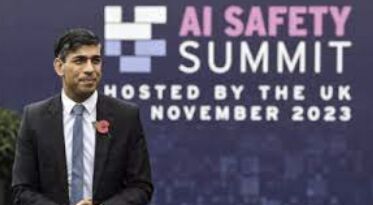Landmark Agreement Reached at AI Safety Summit to Collaborate on Testing New AI Models
British Prime Minister Rishi Sunak and US Vice-President Kamala Harris have reached a landmark agreement at the AI Safety Summit, encouraging collaboration between governments and AI companies to ensure the safe and responsible development of AI. The summit was attended by representatives from various countries, and future summits will be hosted by South Korea and France. The Bletchley Declaration, endorsed by 28 countries, highlights the need for a joint global effort to address AI risks.
British Prime Minister Rishi Sunak concluded the two-day AI Safety Summit with a landmark agreement between governments and artificial intelligence companies to collaborate on testing new AI models before their release. This agreement, reached with US Vice-President Kamala Harris, builds upon the Bletchley Declaration signed by 28 countries, including India, on the shared responsibility of addressing AI risks. The summit, hosted by the UK, saw representatives from the US, EU, France, Germany, Italy, Japan, South Korea, Singapore, Canada, and Australia come together.
The Prime Minister closes out the AI Safety Summit by announcing a landmark agreement with eight major AI companies and likeminded countries on the role of government in pre-deployment testing of the next generation of models for national security and other major risks pic.twitter.com/lLmRZiX7Ip
— Matt Clifford (@matthewclifford) November 2, 2023
Despite China's absence on the second day of talks, Sunak defended the decision to engage with China where possible while protecting against risks. Sunak described the partnership as a significant step towards securing the benefits of AI for humanity in the long term. He also announced that South Korea and France have offered to host the two following summits. Canadian computer scientist Yoshua Bengio, known as the "godfather of AI," will chair the production of an inaugural report on the technology. Furthermore, the Frontier AI Taskforce will evolve into the AI Safety Institute, playing a vital role in research and advising national and international policymaking.
Sunak emphasized the importance of such an institute in ensuring the safe development of AI for the benefit of all. The summit also included discussions with leading AI companies and a special session with tech billionaire Elon Musk. The Bletchley Declaration, endorsed by 28 countries worldwide, acknowledges the urgent need for a joint global effort to develop and deploy AI safely and responsibly.
India's Union Minister of State for Entrepreneurship, Skill Development, Electronics, and Technology, Rajeev Chandrasekhar, expressed the country's commitment to using AI and technology for the benefit of all while upholding accountability under the law. The Declaration addresses risks such as intentional misuse, control issues, cybersecurity, biotechnology, misinformation, bias, and privacy concerns associated with AI.




